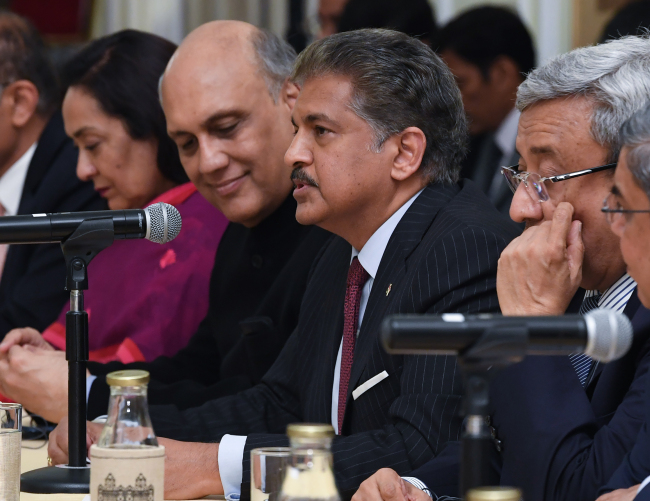SsangYong Motor, the local unit of Indian automaker Mahindra & Mahindra, said Wednesday it will continue to gradually reinstate former employees in line with a consensus reached with its union in 2015.
On the sidelines of President Moon Jae-in’s state visit to India, Moon urged Anand Mahindra, chairman of Mahindra Group, to reinstate SsangYong Motor assembly workers laid off during the carmaker’s restructuring in 2009.
Mahindra responded that SsangYong Motor, which is guaranteed independent management, would resolve the issue.
Mahindra & Mahindra is SsangYong’s largest shareholder with a 72.85 percent stake, acquired at 525.5 billion won ($468.6 million).
“We plan to bring back workers step by step when there are new job opportunities according to the agreement. In the long term, we will continue to communicate and converse with related parties,” the spokesperson of SsangYong Motor told The Korea Herald.
“To ensure sustainable employment, the company can re-hire workers when there is an increase in production.”

Anand Mahindra (second right), chairman of Mahindra Group, speaks during a meeting with South Korean President Moon Jae-in, Indian Prime Minister Narendra Modi alongwith Korea and Indian business leaders in India on Tuesday. (Yonhap)
Reinstating the assembly workers has been a prolonged issue at SsangYong Motor for the past nine years.
In December 2015, three parties involved in the matter-- SsangYong Motor, SsangYong’s unionized labor, and Korean Metal Workers’ Union -- had agreed on SsangYong Motor gradually hiring 165 dismissed workers in the event of job vacancies.
The dismissed employees, however, have been pushing the company to hire all the workers at once, taking the issue to the political arena and fueling deeper conflict.
The longstanding issue resurfaced following the recent death of a former SsangYong employee surnamed Kim, 48, last month, marking the 30th dismissed SsangYong worker to take his life since company restructuring in 2009. Kim reportedly was not able to find a new job and had become a defaulter.
Kim was one of the 2,600 employees who left the company during SsangYong’s 2009 reshuffle as a result of lax management by China’s state-run automaker SAIC Motor, SsangYong’s then-largest shareholder.
Among the 2,600 employees, some 1,900 signed up for voluntary resignations and 454 for non-paid leave of absence, while 165 were fired.
Since then, the dismissed workers have continually staged protests until they reached the compromise in 2015.
According to the agreement, each time SsangYong Motor recruits new employees, 30 percent will be made up of those who had voluntarily resigned, 30 percent of the dismissed employees and 40 percent of new workers. The three parties had also agreed to try to reinstate some 1,200 former employees who wished to come back, by the first half of 2017.
Based on the consensus, all 454 former employees on non-paid leave of absence have returned to SsangYong’s factory in Pyeongtaek, Gyeonggi Province, while 45 out of 165 dismissed employees have been reinstated so far.
SsangYong Motor said it is doing the best it can to bring back as many workers as possible, but the task has not been easy due to limited production.
The operating ratio of the Pyeongtaek plant stood at about 60 percent last year, producing some 150,000 vehicles, the company said.
Due to a demand hike for SsangYong’s best-selling Tivoli compact sport utility vehicle launched in 2015, 40 employees were reinstated in 2016.
In the following year 62 employees came back on demand for the G4 Rexton large SUV, and 26 employees this March for production of G4 Rexton Sports and changes in work shift, it added.
Operating losses at SsangYong Motor totaled 31.3 billion won in the first quarter of this year, double the loss it saw in the same period last year, the company said.
In terms of vehicles sold, it also posted a 10.4 percent drop on-year and sold 30,664 units in the cited period.
Meanwhile, as SsangYong’s largest shareholder, Mahindra will back SsangYong’s decision to spend 1.3 trillion won for its growth in the next three to four years.
Mahindra’s chief vowed to support the local carmaker in a meeting with Moon and Indian Prime Minister Narendra Modi, along with fellow business leaders from Korea and India.
The market instantly reacted to Mahindra’s remarks, with shares of SsangYong Motor soaring 20.84 percent to 5,480 won Wednesday morning on the local bourse.
SsangYong ended the trading day up 4.74 percent at 4,750 won per share.
By Kim Bo-gyung (
lisakim425@heraldcorp.com)






